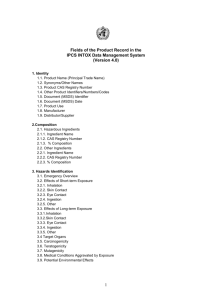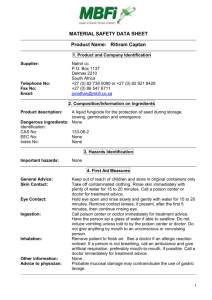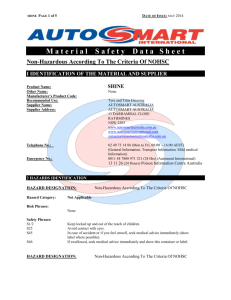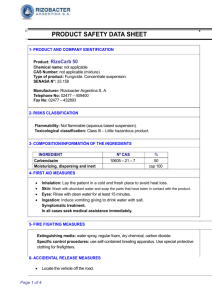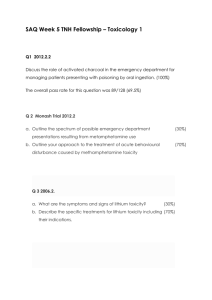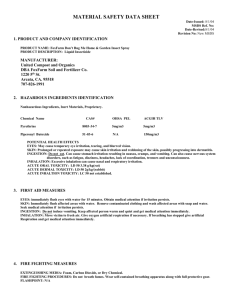safety data sheet - Mogul
advertisement
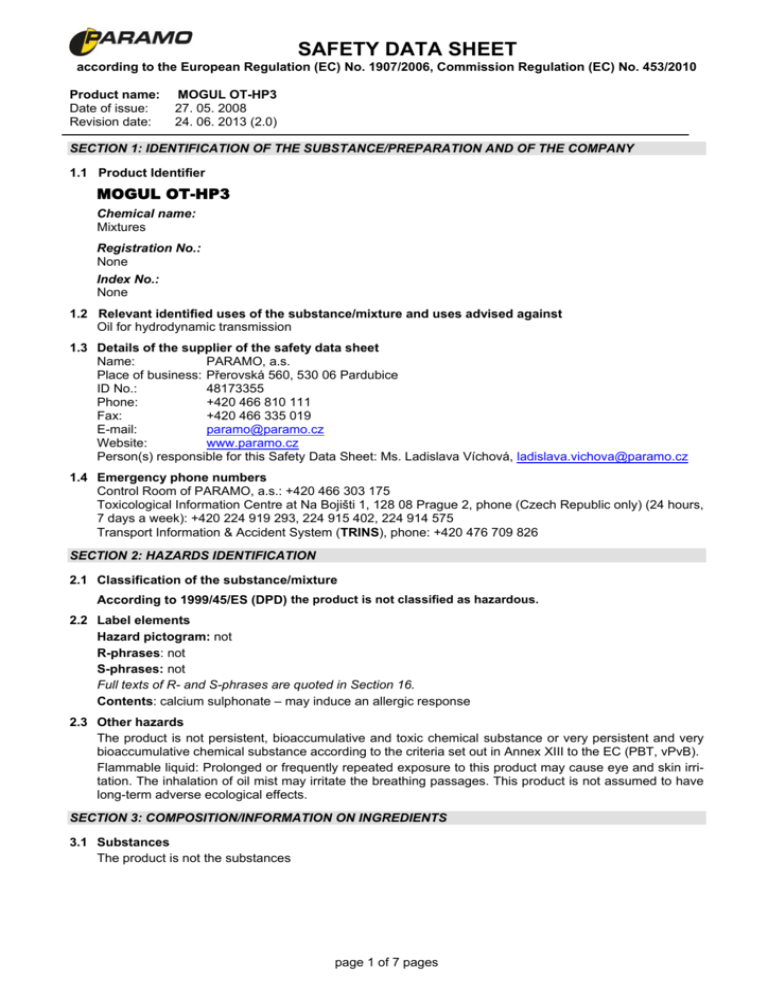
SAFETY DATA SHEET according to the European Regulation (EC) No. 1907/2006, Commission Regulation (EC) No. 453/2010 Product name: Date of issue: Revision date: MOGUL OT-HP3 27. 05. 2008 24. 06. 2013 (2.0) SECTION 1: IDENTIFICATION OF THE SUBSTANCE/PREPARATION AND OF THE COMPANY 1.1 Product Identifier MOGUL OT-HP3 Chemical name: Mixtures Registration No.: None Index No.: None 1.2 Relevant identified uses of the substance/mixture and uses advised against Oil for hydrodynamic transmission 1.3 Details of the supplier of the safety data sheet Name: PARAMO, a.s. Place of business: Přerovská 560, 530 06 Pardubice ID No.: 48173355 Phone: +420 466 810 111 Fax: +420 466 335 019 paramo@paramo.cz E-mail: Website: www.paramo.cz Person(s) responsible for this Safety Data Sheet: Ms. Ladislava Víchová, ladislava.vichova@paramo.cz 1.4 Emergency phone numbers Control Room of PARAMO, a.s.: +420 466 303 175 Toxicological Information Centre at Na Bojišti 1, 128 08 Prague 2, phone (Czech Republic only) (24 hours, 7 days a week): +420 224 919 293, 224 915 402, 224 914 575 Transport Information & Accident System (TRINS), phone: +420 476 709 826 SECTION 2: HAZARDS IDENTIFICATION 2.1 Classification of the substance/mixture According to 1999/45/ES (DPD) the product is not classified as hazardous. 2.2 Label elements Hazard pictogram: not R-phrases: not S-phrases: not Full texts of R- and S-phrases are quoted in Section 16. Contents: calcium sulphonate – may induce an allergic response 2.3 Other hazards The product is not persistent, bioaccumulative and toxic chemical substance or very persistent and very bioaccumulative chemical substance according to the criteria set out in Annex XIII to the EC (PBT, vPvB). Flammable liquid: Prolonged or frequently repeated exposure to this product may cause eye and skin irritation. The inhalation of oil mist may irritate the breathing passages. This product is not assumed to have long-term adverse ecological effects. SECTION 3: COMPOSITION/INFORMATION ON INGREDIENTS 3.1 Substances The product is not the substances page 1 of 7 pages SAFETY DATA SHEET according to the European Regulation (EC) No. 1907/2006, Commission Regulation (EC) No. 453/2010 Product name: Date of issue: Revision date: MOGUL OT-HP3 27. 05. 2008 24. 06. 2013 (2.0) 3.2 Mixtures According to the European Regulation (EC) No 1272/2008, as amended: Substance name Substance content EC No. Hazardous class and Reg. No. in the product (%) category/H-phrases Benzesulfon acid, Ca salt 0.45 271-877-7 none none * Mineral (base) oils Exposure limits see Article 8.1. 01-2119486951-26 *The base oil has a value of DMSO less than 3 %, for is not classified as carcinogenic cat 2 and mutagens. According to 67/548/EHS (DSD) Substance name Substance content EC No. Symbols / R-phrases in the product (%) Benzesulfon acid, Ca salt 0.45 271-877-7 Xi/43, -/53 *Mineral oil (Base oil) Exposure limits see Article 8.1. *The base oil has a value of DMSO less than 3 %, for is not classified as carcinogenic cat 2 with R45. Reg. No. none 01-2119486951-26 Further information For the exposure limits stipulated by the Scientific Committee on Occupational Exposure Limits, see Section 8.1. SECTION 4: FIRST AID MEASURES 4.1 Description of first aid measures If the first aid treatment is to be administered, release tight clothing and keep the exposed person warm and at rest. If conscious, place the exposed person to the stabilised position and get prompt medical attention. If the exposed person is unconscious and not breathing, provide for free respiratory passages and artificial respiration. In case of cardiac arrest, apply cardiac massage and call medical assistance immediately. If unconscious but breathing, place the exposed person to the stabilised position and call medical assistance immediately. The first aid instructions are structured according to separate exposure ways: Inhalation: Move the exposed person to fresh air or to a well-ventilated place, keep the exposed person warm and at rest, do not leave the person unattended. Get prompt medical assistance. Skin contact: Remove the contaminated clothes and footwear immediately. Keep washing the affected body parts with soap and warm water and treat them with a suitable cream. If any irritation, swelling or reddening occurs, get prompt medical assistance. Wash the contaminated clothes before re-use. Footwear and other leather clothing parts must be replaced with new. Contact with eyes: Check for contact lenses and remove them, if present. Rinse the eyes thoroughly with ample quantity of clean (lukewarm, if possible) water for at least 15 minutes. If eye irritation persists, seek medical assistance. Ingestion: Remove any artificial denture, if present. Rinse the mouth with water, but never induce vomiting - vomit should not get into the lungs. Get prompt medical attention. If nevertheless spontaneous vomiting occurs, place the exposed person to the stabilised position with his/her legs slightly elevated. Seek immediate medical assistance. 4.2 Most important symptoms and effects, both acute and delayed The product has negative effects on the central nervous system. Upon inhalation, its narcotic effect in the concentration of 8 mg/l in air causes nausea to narcosis, while concentrations of 40 mg/l may be fatal after 5 to 10 minute inhalation. Repeated exposures may cause chronic neurologic effects. 4.3 Indication of any immediate medical attention and special treatment needed Inhalation: The product has negative effects on the central nervous system. At higher concentrations, the product vapours have narcotic effects that may cause convulsions or even death. Check for breathing and pulse rate of the affected person. Ingestion and inhalation: If swallowed or inhaled, the product may cause serious damage of lungs. Do not induce vomiting. Contraindications: induced vomiting and gastric irrigation. Administration of medicinal charcoal has no effect. The affected person must be monitored at least for the period of 48 to 72 hours. Monitoring for pulmonary oedema symptoms starts six hours after the ingestion/inhalation and it continues at least for the period of 48 to 72 hours. page 2 of 7 pages SAFETY DATA SHEET according to the European Regulation (EC) No. 1907/2006, Commission Regulation (EC) No. 453/2010 Product name: Date of issue: Revision date: MOGUL OT-HP3 27. 05. 2008 24. 06. 2013 (2.0) SECTION 5: FIRE FIGHTING MEASURES 5.1 Extinguishing media Suitable extinguishing means: Heavy, medium and light air-mechanical foam, type B or C fireextinguishing powders. Unsuitable extinguishing means: Water stream. 5.2 Special hazards arising from substance or mixture Products of combustion and hazardous gases: smoke, carbon monoxide, carbon dioxide, nitrogen oxide, sulphur oxide and phosphorus oxide. 5.3 Advice for firefighters Intervention units exposed to smoke or gases must be equipped with protective means to protect the respiratory system and eyes. It is necessary to use an insulating respirator in case of intervention in closed rooms. SECTION 6: ACCIDENTAL RELEASE MEASURES 6.1 Personal precautions, protective equipment and emergency procedures Prevent any contamination of clothing/footwear with the product; prevent any contact with skin and eyes. Use suitable protective clothing; if contaminated, change the clothing immediately. Remove any potential source of ignition. Strictly no smoking or naked flames. If possible, larger spills may be covered with foam in order to control the creation of vapours and aerosols. provide for good ventilation of the affected areas. All persons not taking part in rescue operations must be kept away to a sufficient distance. 6.2 Environmental precautions Act as quick as possible, do not allow to enter drains, underground water or watercourses and soil by enclosing the affected area (damming, closing of gulleys). Notify the relevant authorities. 6.3 Methods and material for containment and cleaning up If possible, contain the spillage and pump off or remove the product mechanically or draw it off the water surface. Let absorb any residua or smaller quantities to a suitable sorbent (Vapex, Chezacarb, saw dust, sand) and place it into labelled containers for further disposal in accordance with the relevant waste disposal legislation. 6.4 References to other sections Apart from the instruction set out in this Section, other important information is shown in section 8 - EXPOSURE CONTROLS AND SECTION 13 – DISPOSAL CONSIDERATIONS. SECTION 7: HANDLING AND STORAGE 7.1 Precautions for safe handling The building must be equipped in accordance with the respective ČSN 75 3415 standard. When handling heavy packaging, use appropriate handling means and exclude the possibility of slipping. 7.2 Conditions for safe storage, including any incompatibilities Store in properly sealed packaging in a place protected from rain, dust, heat and other weather conditions. The maximum storage temperature is 40 °C. 7.3 Specific end use(s) Working fluid for selected types of hydrodynamic clutches, converters and gearboxes in some trucks, buses, building machinery etc., also used for industrial applications. SECTION 8: EXPOSURE CONTROLS / PERSONAL PROTECTIVE EQUIPMENT 8.1 Control parameters Workplace occupational exposure limit (under Regulation No. 361/2007 Coll., as amended): PEL mineral oil: 5 mg/m3 NPK-P mineral oil: 10 mg/m3 Inhalation: long-term exposure: occupational DNEL (inhalation) intermittent = 5.4 mg/m3/8 h general population DNEL (inhalation) intermittent = 1.2 mg/m3/24 h page 3 of 7 pages SAFETY DATA SHEET according to the European Regulation (EC) No. 1907/2006, Commission Regulation (EC) No. 453/2010 Product name: Date of issue: Revision date: MOGUL OT-HP3 27. 05. 2008 24. 06. 2013 (2.0) 8.2 Exposure controls Observe general safety and hygienic measures; do not eat, drink and smoke at work. After washing the skin with warm water and soap, treat it preventively with a regeneration cream. This information extends the facts already shown above in Section 7. Eye/face protection: Use protective goggles or safety eyewear (face shield). Skin protection: Use protective gloves resistant against oil products and tested according to EN 374; best of all made of nitrile or neoprene rubber. Leather or thick textile materials are not suitable. Respiratory protection: Not necessary, if the vapour concentration in air is less than the concentration limits. If the opposite is the case or aerosols are created, use emergency escape mask with A, AX (brown) filters or any other mask types suitable of protecting against organic gases and vapours. Thermal hazard: None Environmental exposure controls: It is necessary to prevent leakage into the environment by all available means. SECTION 9: PHYSICAL AND CHEMICAL PROPERTIES 9.1 Information on basic physical and chemical properties Appearance: liquid Colour: yellow to brown Odour: without odor Odour threshold value: not determined pH: no determination necessary Pour point: -33 °C Initial boiling point and boiling range: not determined Flash point OK: > 180 °C Vaporisation rate: not determined Flammability (solids, gases): IV. Class Upper/lower explosion or flammability limits: not determined Vapour pressure: < 10 Pa at 20 °C Vapour density: not determined Relative density: 880 kg/m3 at 15 °C Solubility: insoluble in water Separation factor: n-octanol/water: not determined Self-ignition temperature: 360 °C Decomposition temperature: not determined Viscosity/40 °C: 28.8 – 35.2 mm2/s Explosive properties: not explosive Oxidation properties: not oxidising 9.2 Other information Combustion point: 235 °C SECTION 10: STABILITY & REACTIVITY 10.1 Reactivity: No reactivity danger exists. 10.2 Chemical stability: Stable under recommended storage and handling conditions. 10.3 Possibility of dangerous reactions: No dangerous reactions are possible. 10.4 Conditions to be avoided: Creation of concentrations within the explosion limits, presence of ignition sources and contact with a naked flame. 10.5 Incompatible materials: Strong oxidisers. page 4 of 7 pages SAFETY DATA SHEET according to the European Regulation (EC) No. 1907/2006, Commission Regulation (EC) No. 453/2010 Product name: Date of issue: Revision date: MOGUL OT-HP3 27. 05. 2008 24. 06. 2013 (2.0) 10.6 Hazardous decomposition products: Under normal conditions: none; if burning under deficiency of air, carbon monoxide may be formed. SECTION 11: TOXICOLOGICAL INFORMATION 11.1 Information on toxicological effects Acute toxicity: oral toxicity (rat) LD50 > 5 000 mg/kg (OECD 401) dermal toxicity (rabbit) LD50 > 2 000 mg/kg (OECD 402) inhalation toxicity (rabbit) LC50 > 5 000 mg/m3 (OECD 403) Chronic toxicity: chronic inhalation toxicity NOAEC > 220 mg/m3 (OECD 412) Skin corrosion/irritation: OECD 404 test results proved no the skin irritation. Serious eye damage/irritation: OECD 405 test results proved no eye irritation. Respiratory or skin sensitization: the respiratory organ sensitisation data are missing, but no such sensitisation is expected. As regards the sensitisation by skin contact, OECD 406 tests were made and no sensitisation proved. Germ cell mutagenicity: Tests of genetic toxicity in vitro and in vivo showed mutagenicity in germ cells Carcinogenicity: It is not carcinogenic for dermal or inhalation exposure. Reproduction toxicity: The substance is not toxic for reproduction. STOT – single exposure: not determined STOT – repeated exposure: not determined Aspiration hazards: May be fatal if swallowed and enters airways. SECTION 12: ECOLOGICAL INFORMATION Based on acute toxicity of invertebrates and algae, the product is not classified as toxic to the environment. 12.1 Toxicity Acute toxicity for aquatic environment: fish - LL50 (96 hrs) > 100 mg/l, NOEL ≥ 100 mg/l (OECD 203) algae EL50 (72 hrs) ≥ 100 mg/l (OECD 201) invertebrates EL50 (48 hrs) > 10 000 mg/l, NOEL ≥ 1000 mg/l (OECD 202) Chronic toxicity for aquatic environment: invertebrates NOELR (21 days) 10 mg/l, fish NOEL (21 days) 10 mg/l Toxicity for soil microorganisms and for soil macroorganisms: none 12.2 Persistence and degradability: Not expected - the substance is not soluble in water. 12.3 Bioaccumulative potential: Not expected - the substance is biodegradable. 12.4 Mobility in soil: Not expected - the substance is biodegradable. 12.5 Results of PBT and vPvB assessment: Not expected because of the composition and low solubility in water. 12.6 Other adverse effects: The formation of product layers on water surfaces prevents the access of oxygen. SECTION 13: DISPOSAL CONSIDERATIONS 13.1 Waste treatment methods Substance disposal procedures: Waste, impaired product or unused/surplus product must be handed over to the person authorised for waste disposal according to the provisions of Act No. 185/2001 Coll., on Waste, as amended later, for the purposes of further use or disposal (according to the manufacturer’s recommendations). Waste code: N 13 01 10, in sorbent: N 15 02 02 Contaminated packaging disposal procedures: Base oil is supplied in rail tanks and tank trucks. If repumped into drums, these must be handed over – properly emptied – to the collection yard for hazardous page 5 of 7 pages SAFETY DATA SHEET according to the European Regulation (EC) No. 1907/2006, Commission Regulation (EC) No. 453/2010 Product name: Date of issue: Revision date: MOGUL OT-HP3 27. 05. 2008 24. 06. 2013 (2.0) waste. The containers with product residua must be placed on the place specified by the municipal authorities or handed over to the person authorised for waste disposal. Waste legislation: Act No. 185/2001 Coll., on Waste, as amended later and connected implementation rules and regulations. The information important for safety of persons in the waste management system extends the information set out in section 8. SECTION 14: TRANSPORT INFORMATION Nomenclature and labelling according to the European Agreement concerning the International Carriage of Dangerous Goods, Road (ADR)/Rail (RID) 14.1 UN Number: none 14.2 UN proper shipping name: none 14.3 Transport hazard class(es): none 14.4 Packing group: none 14.5 Environmental hazard: yes (no pictogram) 14.6 Special precautions for users: Petroleum liquids under the Act on the waters, as amended, considered dangerous because of the requirements of the quality of surface and groundwater when transporting large volumes necessary to follow the advice of Standard 75 3418. 14.7 Transport in bulk according to Annex II of MARPOL 73/78 and IBC Code: not applicable SECTION 15: REGULATORY INFORMATION 15.1 Safety, health and environmental regulations/legislation special for the substance or mixture 9 Act No. 201/2012 Coll., on Clean Air Protection, as amended later, incl. connected regulations and rules. The product does not represent a volatile organic substance pursuant to Act N. 201/2012 Coll., as amended and relevant regulations of the Ministry of Environment. 9 ČSN 65 0201 Flammable Liquids – manufacturing, storage and handling premises According to ČSN 65 0201, the product is classified in the IV Flammability Class. 9 ČSN 33 0371 Inexplosive electrical installation – Explosive mixtures – Classification and methods of testing According to ČSN 33 077, the product is classified in the T3 Thermal Class and IIA Explosive Class. 9 Government Regulation No. 361/2007 Coll., by which the conditions of occupational health and safety are stipulated, as amended later. 9 ČSN 75 3415 Protection of water against oil products. Premises for oil product handling and storage. 9 Act No. 350/2011 Coll., on chemical substances and chemical mixtures, and on amendments of some acts. 9 Regulation (EU) No. 453/2010 of 20 May 2010 amending Regulation (EC) No 1907/2006 of the European Parliament and of the Council on the Registration, Evaluation, Authorisation and Restriction of Chemicals (REACH) 9 Regulation (EC) No. 1272/2008 on classification, labelling and packaging of substances and mixtures 15.2 Chemical safety assessment The chemical safety assessment has been made. SECTION 16: OTHER INFORMATION 16.1 List of H-phrases according to Regulation (EC) No. 1272/2008: Standard safety phrases: H-phrases None page 6 of 7 pages SAFETY DATA SHEET according to the European Regulation (EC) No. 1907/2006, Commission Regulation (EC) No. 453/2010 Product name: Date of issue: Revision date: MOGUL OT-HP3 27. 05. 2008 24. 06. 2013 (2.0) 16.2 List of R-phrases and S-phrases according to Act No. 1999/45/EC Coll., as amended: Standard sentences specifying specific hazard (R-phrases): None Standard instructions for safe handling (S-phrases): None 16.3 Information on changes 9 The change was made on the basis of Commission Regulation (EU) No 453/2010. The data contained in this safety data sheet are based on our current knowledge and experience and they are related to the specified product only. The user is responsible for the product correct handling under the current legislation. page 7 of 7 pages
